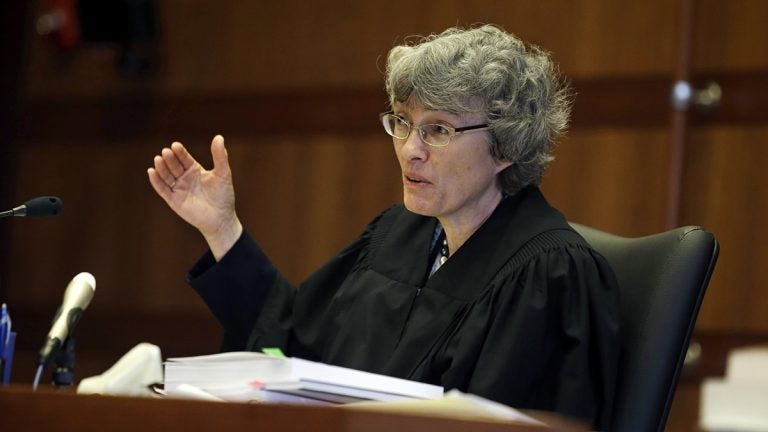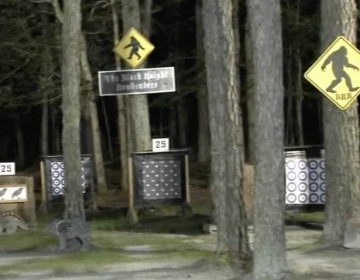The Bridgegate probe still has a heartbeat

New Jersey Superior Court Judge Mary Jacobson in a March 2014 photo. (AP Photo/Mel Evans, Pool)
For Assemblyman John Wisniewski (D-Middlesex) and Senate Majority Leader Loretta Weinberg (D-Bergen), the cochairs of the Legislature’s Select Committee on Investigation, yesterday’s ruling that the Fifth Amendment rights of fired GOP political operatives Bill Stepien and Bridget Kelly trumped their committee’s interest in getting to the bottom of the Bridgegate scandal was not unexpected, but is clearly both an investigative and a political setback.
Assemblywoman Amy Handlin (R-Monmouth) immediately seized upon Superior Court Judge Mary Jacobson’s ruling to renew her pitch from Tuesday’s committee meeting that it was time for the panel to put its efforts into legislating, not investigating.
“The judge’s opinion sends a clear message that the committee has overstepped its bounds,” Handlin insisted. “Federal and state prosecutors are fully capable of investigating and are clearly doing so. Our legislative responsibility is to find solutions to the many problems we have already uncovered. It would be a disservice to the people of New Jersey if the Legislature does not immediately move forward on the reform bills that have been introduced on a bipartisan basis.”
Wisniewski was not fazed by the ruling, and said the panel would consult with its special counsel, Reid Schar, to consider its next steps.
“The committee felt it was very much in the public interest to seek to compel the production of these documents, but as we’ve said before, there’s more than one method to gather information in an investigation, and we will consider alternatives,” Wisniewski said. “We will continue exploring every avenue to find out what happened with this threat to public safety and abuse of government power.”
Fewer documents to work with
In the short term, what Jacobson’s ruling means is that Kelly, Gov. Chris Christie’s former deputy chief of staff who emailed the infamous “time for some traffic problems in Fort Lee” order, and Stepien, Christie’s former campaign manager, do not have to turn over emails, documents or other records of their communications with each other or with other members of Christie’s administration, reelection campaign, Port Authority officials or anyone else.
This will clearly hinder the Wisniewski-Weinberg committee’s efforts to investigate the direct links between the Christie campaign, which Stepien ran, and Kelly’s efforts as deputy chief of staff to line up support for Christie’s reelection by rewarding supporters and punishing those — like Democratic Mayors Mark Sokolich of Fort Lee, Dawn Zimmer of Hoboken, and Steve Fulop of Jersey City — who did not come through with hoped-for endorsements.
While the committee is still waiting for the governor’s 2013 reelection campaign to fully comply with the subpoena, its submissions presumably would not include any communications on personal emails, texts, and cell phones records between Stepien and Kelly, who made a habit of switching to personal accounts for sensitive political matters, as was shown in her previously obtained communications with David Wildstein, the Port Authority official who carried out the lane closures.
Further, the ruling will make it harder for the legislative committee to determine the extent to which other Christie administration or campaign staffers were aware of political activities directed by or carried out by Kelly in the governor’s office that might have violated state statutes, including her role in the closure of toll lanes leading into the George Washington Bridge from September 9 to September 13 in apparent political retaliation against Sokolich for refusing to endorse Christie.
Others might testifyBut it is important to recognize that even if Kelly and Stepien had been compelled to turn over emails, texts, phone records, and other documents, both were expected to follow Wildstein’s example in exercising their Fifth Amendment rights against self-incrimination and refusing to answer any questions posed by the investigative committee when summoned to testify.
Wisniewski, in fact, recognized the likelihood that Kelly and Stepien would be able to invoke the Fifth Amendment during a press conference following the Select Committee on Investigation meeting on Tuesday. Wisniewski said he expected that some of the first witnesses called to testify would most likely include staffers in the governor’s office named in some of the Kelly emails that were included in the report by Randy Mastro and his Gibson Dunn team of lawyers commissioned by the governor’s office.
Mastro’s report recommended disbanding the Office of Legislative Relations and Intergovernmental Affairs in the governor’s office, which virtually functioned as a political arm of Christie’s reelection effort under Kelly and presumably under her predecessor, Stepien, who was the governor’s top hands-on political operative in both the 2009 and 2013 campaigns and in the governor’s office in between.
Presumably, the Wisniewski-Weinberg committee would investigate the politicization of the Office of Legislative Relations and Intergovernmental Affairs by calling in Kelly’s top subordinates, Christine Genovese Renna and Evan Ridley. Also likely to be called in would be Matt Mowers, who followed Stepien from that office to the reelection campaign, then moved to become executive director of the New Hampshire Republican Party, where it was expected he would lay the groundwork for Christie’s 2016 primary campaign.
Based on Wisniewski’s comments Tuesday, it appears that Renna, Ridley, and Mowers all complied with subpoenas from the committee, and Renna refused to destroy a potentially incriminating email when requested to do so by Kelly, according to the Mastro report.
Kelly and Stepien, of course, would be the best-positioned to testify about political activities in the governor’s office, but their lawyers, Michael Critchley and Kevin Marino, both stated that they would testify only in exchange for immunity.
That grant of immunity would have to come from U.S. Attorney Paul Fishman, who has convened a 23-member federal grand jury in Newark to consider criminal charges in Bridgegate, as well as Zimmer’s allegation that Christie administration officials threatened to withhold Sandy aid if she did not support a high-rise development represented by David Samson, Christie’s Port Authority chairman and 2009 campaign counsel.
Perils of granting immunity
While the legislative investigative committee has the power to grant immunity for testimony before the committee, that limited grant of immunity could pose problems for the U.S. Attorney’s Office if it needs to rely on evidence presented before the legislative panel, Jacobson noted.
Wildstein, who also has been seeking immunity, met last week for several days with the U.S. Attorney’s Office, but it is unclear whether Fishman would allow a potential star witness to testify publicly before a legislative panel before he completes his grand jury investigation, which could take up to 18 months.
However, it appears that the Wisniewski-Weinberg committee does have the opportunity to use its subpoena power to delve deeply into the issue of whether the Christie administration’s failure to ferret out the truth about Bridgegate before the release of the Kelly email on January 8 was due to a coverup, ineptness, or an “us against them” mentality that led Christie and his aides to simply accept Baroni’s assertion at face value that the George Washington Bridge lane closures were part of a legitimate traffic study.
Michael Drewniak, the governor’s press secretary who was a friend of Wildstein and played a pivotal role in preparing the administration response to Bridgegate inquiries, testified before the federal grand jury Friday.
Kevin O’Dowd, the Chief of Staff whom Christie had nominated to serve as his next Attorney-General before Bridgegate broke, has clear incentive to protect his reputation and career, as does Charles McKenna, the Chief Counsel who questioned Baroni on Bridgegate in early October at Christie’s directive, and is now head of the Schools Development Authority. McKenna reportedly met with Fishman’s investigators in mid-January shortly after the release of the Kelly emails.
Regina Egea, the director of the governor’s authorities unit who first received from Baroni a copy of the angry email from Port Authority Executive Director Patrick Foye alleging that federal and state laws had been broken by the lane closures, would presumably also need to answer questions if she plans to be Christie’s second-term chief of staff.
Finally, there is the question of whether the panel would exercise its subpoena power to call in Governor Christie himself – a decision that would be fraught with complex political overtones and constitutional issues.
_________________________________________
NJ Spotlight, an independent online news service on issues critical to New Jersey, makes its in-depth reporting available to NewsWorks.
WHYY is your source for fact-based, in-depth journalism and information. As a nonprofit organization, we rely on financial support from readers like you. Please give today.




